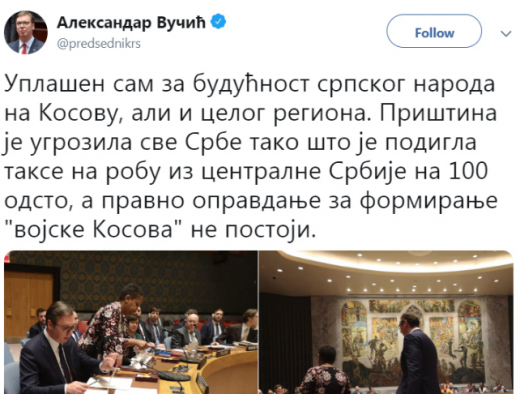The presidents of Serbia and Kosovo traded accusations Monday at the U.N. Security Council over Kosovo’s decision to transform its 4,000-strong security force into a regular army and Serbia’s threat of armed intervention — but both expressed their readiness for dialogue, AP reports.
Serbian President Aleksandar Vucic accused Kosovo of violating a 1999 U.N. resolution by deciding to form an army and demanded to know from what document “do they derive their so-called sovereign right to form their own military? Where is that written?” He answered: “I can tell you in advance, nowhere.”
Kosovo’s president, Hashim Thaci, countered that his country is a sovereign nation and has an absolute right to form its own army. “If Kosovo made a mistake it is only that it waited for five years … to establish an army.” He added, in obvious criticism of Serbia: “It is belated because we waited for goodwill from those who never showed goodwill towards Kosovo.”
Kosovo was a province of Serbia and came under U.N. and NATO administration after a 1999 NATO-led air war halted a Serbian crackdown on ethnic Albanian separatists. The Security Council resolution that established the interim U.N. administration left the final status of Kosovo in question.
Kosovo’s predominantly ethnic Albanian leadership declared independence in 2008, and Kosovo has been recognized by 116 countries. Serbia rejects its secession, and Russia, a close ally and veto-wielding Security Council member, has blocked Kosovo from becoming a member of the United Nations.
The council meeting highlighted the nearly two decade-long stalemate over Kosovo and the escalating tensions in the western Balkans. At the same time, both Kosovo and Serbia say they see their futures in the European Union, which has been trying for years to normalize relations between them — so far unsuccessfully.
Russian Ambassador Vassily Nebenzia, using the strongest language, accused Kosovo of engaging in “lawlessness” with its decision to transform the Kosovo Security Force into an army and warned that “the situation has become explosive.”
“The most serious concern is about the possibility of incursions of armed Kosovar Albanian units into the northern Serb-populated regions of Kosovo in order to establish control by force of (the Kosovo government in) Pristina over the whole territory,” he said.
Nebenzia warned that “triggering such a scenario could lead to bloodshed and become a real catastrophe, return the Balkans to a period of turmoil and bury efforts to stabilize the region.”
He questioned whether the international presence in the area was ready or able to prevent “such a blitzkrieg scenario.”
Both Nebenzia and Vucic stressed the restraint that Serbia has shown.
“Serbia has always been doing everything to keep stability, to maintain tranquility and peace in the entire region,” Vucic said. “We will restrain ourselves of doing wrong steps in the future as well, because we suffered a lot in the past and we don’t have more kids to send to different parts of war, hostilities and crises.”
Kosovo’s Thaci said the parliament’s decision on forming an army is “irreversible,” but added that the transformation will be done in very close cooperation with NATO and will produce a professional, multi-ethnic force.
The transformation is “not against anyone,” he added, and “Kosovo’s army is not and will never be a threat to anybody.”
Speaking of Serbia, Thaci said, “The problem that our northern neighbor has today is not with Kosovo’s army but rather the existence of Kosovo as an independent and sovereign state.”
“These circumstances make the dialogue between our two countries crucial,” he said. “Without dialogue and without a final agreement we will become countries that produce endless and unnecessary drama for domestic consumption, for bilateral consumption, but detrimental for the future of our countries.”
Serbia’s Vucic begged the Security Council “to tame” Kosovo’s actions, including its recent hike in tariffs on goods imported from Serbia and Bosnia from 10 percent to 100 percent.
“Serbia is always ready to resume the process of dialogue,” he said. “We would like to call upon the U.N. to take a bigger role in the future.”
Before the council met, eight European countries issued a joint statement backing Kosovo’s “sovereign right” to gradually transform the Kosovo Security Force into an army, saying this should be “a transparent and inclusive process” over 10 years including all communities in the country.
The eight countries — Belgium, France, Germany, Italy, Netherlands, Poland, Sweden and United Kingdom — also called for an agreement normalizing relations between Serbia and Kosovo.






Comments are closed for this post.